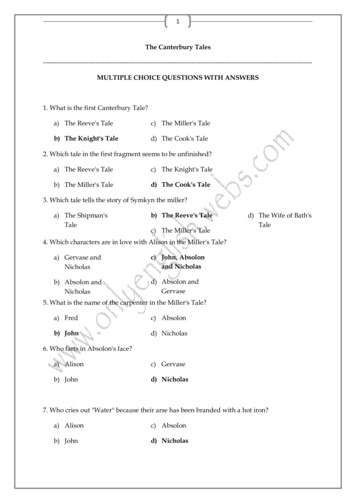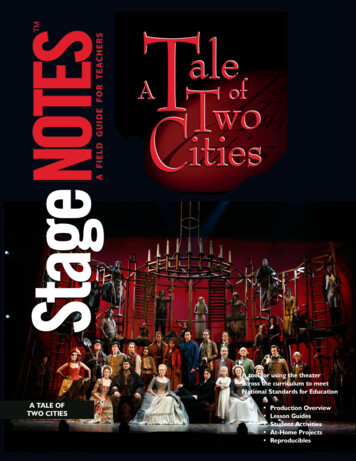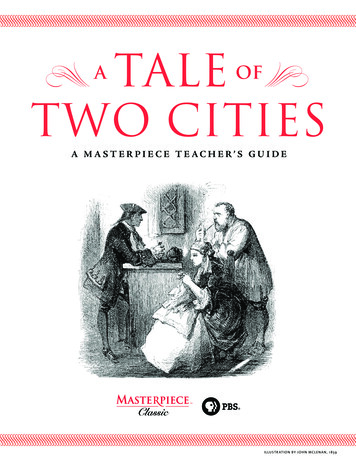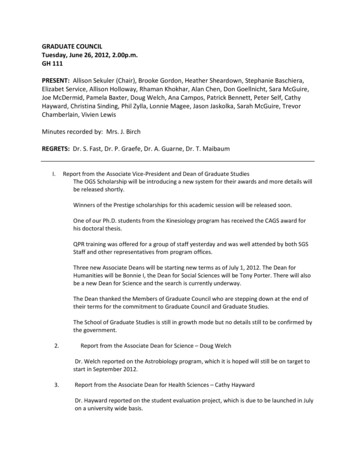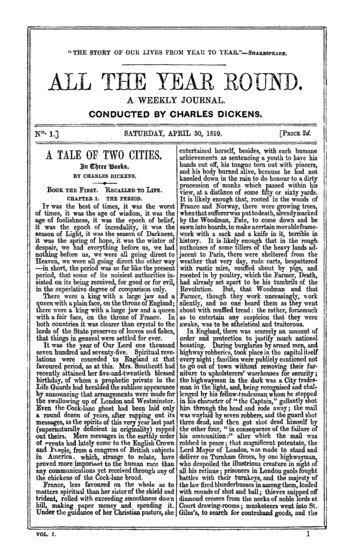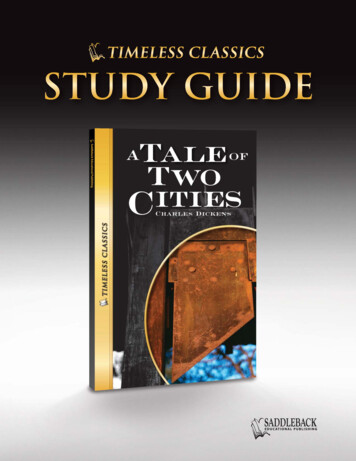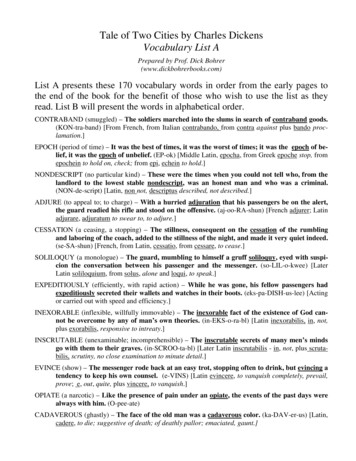
Transcription
Tale of Two Cities by Charles DickensVocabulary List APrepared by Prof. Dick Bohrer(www.dickbohrerbooks.com)List A presents these 170 vocabulary words in order from the early pages tothe end of the book for the benefit of those who wish to use the list as theyread. List B will present the words in alphabetical order.CONTRABAND (smuggled) – The soldiers marched into the slums in search of contraband goods.(KON-tra-band) [From French, from Italian contrabando, from contra against plus bando proclamation.]EPOCH (period of time) – It was the best of times, it was the worst of times; it was the epoch of belief, it was the epoch of unbelief. (EP-ok) [Middle Latin, epocha, from Greek epoche stop, fromepochein to hold on, check; from epi, echein to hold.]NONDESCRIPT (no particular kind) – These were the times when you could not tell who, from thelandlord to the lowest stable nondescript, was an honest man and who was a criminal.(NON-de-script) [Latin, non not, descriptus described, not described.]ADJURE (to appeal to; to charge) – With a hurried adjuration that his passengers be on the alert,the guard readied his rifle and stood on the offensive. (aj-oo-RA-shun) [French adjurer; Latinadjurare, adjuratum to swear to, to adjure.]CESSATION (a ceasing, a stopping) – The stillness, consequent on the cessation of the rumblingand laboring of the coach, added to the stillness of the night, and made it very quiet indeed.(se-SA-shun) [French, from Latin, cessatio, from cessare, to cease.]SOLILOQUY (a monologue) – The guard, mumbling to himself a gruff soliloquy, eyed with suspicion the conversation between his passenger and the messenger. (so-LIL-o-kwee) [LaterLatin soliloquium, from solus, alone and loqui, to speak.]EXPEDITIOUSLY (efficiently, with rapid action) – While he was gone, his fellow passengers hadexpeditiously secreted their wallets and watches in their boots. (eks-pa-DISH-us-lee) [Actingor carried out with speed and efficiency.]INEXORABLE (inflexible, willfully immovable) – The inexorable fact of the existence of God cannot be overcome by any of man’s own theories. (in-EKS-o-ra-bl) [Latin inexorabilis, in, not,plus exorabilis, responsive to intreaty.]INSCRUTABLE (unexaminable; incomprehensible) – The inscrutable secrets of many men’s mindsgo with them to their graves. (in-SCROO-ta-bl) [Later Latin inscrutabilis - in, not, plus scrutabilis, scrutiny, no close examination to minute detail.]EVINCE (show) – The messenger rode back at an easy trot, stopping often to drink, but evincing atendency to keep his own counsel. (e-VINS) [Latin evincere, to vanquish completely, prevail,prove; e, out, quite, plus vincere, to vanquish.]OPIATE (a narcotic) – Like the presence of pain under an opiate, the events of the past days werealways with him. (O-pee-ate)CADAVEROUS (ghastly) – The face of the old man was a cadaverous color. (ka-DAV-er-us) [Latin,cadere, to die; suggestive of death; of deathly pallor; emaciated, gaunt.]
VOCABULARY LISTS FROM THE TALE OF TWO CITIES BY CHARLES DICKENSPREPARED BY PROF. DICK BOHRER2EMACIATED (withered) – His emaciated hand and fingers clutched the bricks as he sought to escape down the wall. (e-MA-she-ate-ed) [ Latin emaciates, participle of emaciare, to make lean;e plus maciare, to make lean; from macies, leanness.]DISCOURSE (conversation) – He kept up in his mind an imaginary discourse with the wretchedcreature. (DIS-kors) [French discourse, from Latin disqursus, from discurrere, discursum, to runto and fro; from dis plus curare, to run.]ADMONISH (scold, warn, reprove) – He would be lost in his thoughts until an impatient movementfrom his fellow passengers would admonish him to close the window. (ad-MON-ish) [FromOld French, from Latin admonere, to remind, warn; from ad plus monere, to warn.]PLACID (undisturbed) – The sun rose, bright, placid and beautiful. (PLA-sid) [Latin, placidus, fromplacere, to please.]SONOROUS (resonant) – He had a loud watch which ticked a sonorous sermon under his flappedwaistcoat. (so-NOR-us) [Latin, sonorous, from sonor plus oris, a sound.]EVANESCENCE (vanishing, disappearing) – The watch seemed to be pitting its gravity and longevity against the levity and evanescence of the fire. (ev-a-NES-ens) [Latin, evanescere, from e,out and vanescere, to vanish; from vanus, empty, vain.]LEVITY (lightness, gaiety, frivolity) – The watch seemed to be pitting its gravity and longevityagainst the levity and evanescence of the fire. (LEV-i-tee) [Old French and Latin, levitas, levislight.]GRAVITY (earnestness, the state of being grave) – The watch seemed to be pitting its gravity andlongevity against the levity and evanescence of the fire. (GRAV-i-tee) [Latin gravitas, weight,heaviness, gravis, heavy.]LONGEVITY (long life) – The watch seemed to be pitting its gravity and longevity against the levity and evanescence of the fire. (lon-JEV-i-tee) [Latin, longaevitas, longaevus; longus, longplus aevum, age.]SPECULATE (meditate, ponder) – Although fatigued, he would not sleep and sat there, content tospeculate on the two slumbering forms. (SPEK-u-late) [Latin speculatus, speculari, to spy out,observe.]SUPPRESS (compose, restrain) – Mr. Lorry’s face was habitually suppressed and quieted. (suPRES) [Latin suppressus, suprimere, to suppress.]PISCATORY (fish-like) – The air among the houses was of so strong and piscatory flavor that onemight have supposed sick fish went up to be dipped in it as sick people went down to bedipped in the sea. (PIS-ka-to-ree) [Latin piscatorius, derived from piscis, fish.]STOLID (not easily excited) – He emptied his cup with an air of stolid desperation and followed theanxious waiter out of the room. (STOL-id) [Latin stolidus.]PECUNIARY (relating to money) – “Feelings! I have no time for them, no chance of them,” Mr.Lorry expostulated. “I pass my whole life, Miss, in turning an immense pecuniary mangle.”(pa-KYU-ne-a-ree) [Latin pecuniarius, from pecunia money – originally property in cattle, frompecus, cattle.]EXPOSTULATE (to object, to reason earnestly) - “Feelings! I have no time for them, no chance ofthem,” Mr. Lorry expostulated. “I pass my whole life, Miss, in turning an immense pecuniary mangle.” (eks-POS-tyu-late) [Latin expostulatus, expostulare, to demand vehemently,strongly, to require.]
VOCABULARY LISTS FROM THE TALE OF TWO CITIES BY CHARLES DICKENSPREPARED BY PROF. DICK BOHRER3SUPPLICATORY (beseeching, praying) – “Pray,” said Mr. Lorry in a soothing tone, bringing hisleft hand from the back of the chair to lay it on the supplicatory fingers, “pray control youragitation—a matter of business.” (SUP-lick-a-to-ree) [Latin supplicatus, supplicare, to supplicate, from sub and plicare, to fold under, bend under.]SCAVENGERS (people, animals, things that clean up refuse and filth) – Not only did all the wine getsopped up off the street, but so much mud got taken up along with it, that one might havesupposed that there had been a scavenger in the street. (SKAV-en-jers) [Middle Englishscavanger, an officer who inspects.]COUNTENANCE (facial expression) – A cloud, dark and heavy, settled on the sacred countenanceof Saint Antoine—for cold, dirt, sickness, ignorance and want were the lords in waiting onthe saintly presence. (KOWN-te-nens) [Old French countenance, demeanor, from Latin continentia, continence, continere, to hold together, repress.]MEAGRE (thin, sparse) – The butcher had only the leanest scraps of meat to sell and the bakeronly the coarsest of meagre loaves. (ME-ger) [Old French megre, maigre, from Latin, macer,lean.]GLOWERING (scowling, staring with anger) – The people croaked over their scanty measures offood and drink and were gloweringly confidential together. (GLOU-er-ing) [Middle English,gloren.]IMPLACABLE (immovable, not subject to pressure) – Monsieur Defarge was good-humored-lookingon the whole, but implacable-looking too. (im-PLAK-a-bl) [Latin implacabilis, in not pluspacabilis, placable.]COMPOSURE (calmness) – Madame Defarge was stout, her eyes watchful, her hand heavilyringed, her face steady, her features strong, her manner one of great composure. (kom-POshur)FEIGN (pretend) – Monsieur Defarge feigned not to notice the elderly gentleman and the younglady. (FANE) [Old French feindre, feignant; from Latin fingere, to form, shape , invent.]TRIUMVIRATE (group of three) – He fell into discourse with the triumvirate of customers whowere drinking at the counter. (tri-UM-ver-ut) [Latin, from trium virorum, of three men.]HOMAGE (reverential regard) – Madame Defarge acknowledged the bows and homage of the threecustomers by bending her head. (OM-ij) [Old French from Middle Latin hominaticum, fromLatin homo, a man, Middle Latin also, a client, vassal.]DISCREET (prudent, showing discernment) – “He is as he was when I first saw him,” whispered Defarge. “They demanded to know if I would take him, and, at my peril be discreet.” (disKREET) [Old French discret, from Latin, discretus, discern.]INTANGIBLE (not material, not capable of being touched) – The uncontrollable and hopeless massof decomposition so engendered by the refuse would have polluted the air, even if povertyand deprivation had not loaded it with their intangible impurities. (in-TANJ-i-b’l) [LaterLatin tangibilis, from in not and tangere, to touch.]DEPRIVATION (the state of having lost something forcibly, a loss) – The uncontrollable and hopeless mass of decomposition so engendered by the refuse would have polluted the air, even ifpoverty and deprivation had not loaded it with their intangible impurities. (dep-ri-VA-shun)[Later Latin deprivatio; Middle English depriven; Old French depriver, to deprive, separate.]
VOCABULARY LISTS FROM THE TALE OF TWO CITIES BY CHARLES DICKENSPREPARED BY PROF. DICK BOHRER4INCUMBENT (obligatory) – By this time Lucie trembled under such strong emotion that Mr.Lorry felt it incumbent on him to speak a word or two of reassurance. (in-KUM-bent) [Latinincumbens, incumbere, to press upon.]OBSCURITY (hidden or remote state) – Only long habit could have formed in anyone the ability todo any work requiring skill in such obscurity. (ob-SCU-ri-ti) [French obscure, from Latin obscurus, covered.]DEPLORABLE (sad, wretched) – The deplorable peculiarity regarding his voice was that it was thefaintness of solitude and disuse. (de-PLOR-a-b’l) [French deplorer, from Latin deplorare, tocry out, lament.]PERCEPTION (consciousness) – After some minutes had passed, the haggard eyes looked up again,not with any interest or curiosity, but with a dull mechanical perception. (per-SEP-shun)[Old French and Latin, perseptio.LETHARGY (a state of inaction) – He had gradually drooped to the floor and lay there in a lethargy, worn out. (LETH-er-ji) [Old French litartie; from Later Latin lethargia; from Greek lethargia, lethargos forgetful, from lethe forgetfulness.]SAGACITY (cleverness, wisdom, shrewdness) – Whether he knew what had happened or whetherhe knew that he was free, were questions which no sagacity could have solved. (sa-GAS-i-ti)[Latin sagax, sagacis.]INVARIABLY (without exception, constantly) – He had pleasure in the mere sound of his daughter’s voice, and invariably turned to it when she spoke. (in-VAR-ee-a-blee)COERCION (force) – In the submissive way of one long accustomed to obey under coercion, he ateand drank what they gave him to eat and drink. (ko-ER-shun) [Latin coercere, from co andarcere to shut up, press together.]APPARENT (clear to the understanding) – That he had no recollection whatever of his having beenbrought from his prison to that house was apparent to them. (a-PAR-ent) [Old Frenchaparant, aparvir.]DISCERNIBLE (distinguishable) – No crowd was about the door; no people were discernible at anyof the many windows. (di-SERN-i-b’l) [Old French discerner; from Latin discerrnere to distinguish.]INCOMMODIOUS (not spacious, inconveniently small) – Tellson’s Bank was very small, very dark,very ugly, very incommodious. (in-com-O-dee-us) [French, from commode convenient; fromLatin commodus measure, mode.]EMBELLISHMENT (adornment) – Tellson’s (they said) wanted no elbow room, Tellson’s wantedno light, Tellson’s wanted no embellishment. (em-BELL-ish-ment) [Old French embellir beautiful.]DECOMPOSE (decay) – At Tellson’s your banknotes had a musty odor, as if they were fast decomposing into rags again. (de-kom-POZ) [French decomposer.]EXTEMPORIZE (improvise, to make without preparation) – At Tellson’s your mortgages got into extemporized strong-rooms made of kitchens and pantries. (eks-TEM-po-riz) [Latin from exout and tempore, ablative of tempus time.]APPELLATION (name or designation) – His surname was Cruncher, and when he was christened,he received the added appellation of Jerry. (ap-el-A-shun)
VOCABULARY LISTS FROM THE TALE OF TWO CITIES BY CHARLES DICKENSPREPARED BY PROF. DICK BOHRER5HARLEQUIN (a comic figure in many-colored clothes) – Mr. Cruncher reposed under a patchworkcounterpane, like a Harlequin at home. (reposed lay quietly, counterpane quilt)(HAR-lakwin) [French harlequin, arelquin; from Italian arlecchino; from old French Herlekin a demon,goblin.]TREPIDATION (fearful agitation) – Mrs. Cruncher rose from her knees in a corner with sufficienthaste and trepidation to show that she was the one he was accusing. (trep-i-DA-shun) [Latintrepidation, trepidare to tremble, from trepidus disturbed, alarmed.]EFFICACY (effectiveness) – Her husband, afraid of the efficacy of his wife’s prayers, refused to lether pray. (EF-i-ka-si) [Latin efficacies, efficere to bring to pass.]ANIMOSITY (strong hatred, ill will) – He showed such animosity to any display of her love of Godthat for the sake of peace she did her praying in private. (an-i-MOS-i-ti) [French animosite;Latin animositas boldness.]DEPRECATE (to express disapproval) – Young Jerry strongly deprecated any praying his mothermight do. (DEP-re-kate) [Latin deprecatus, deprecari to avert by prayer; from de and precari topray.]FORAY (short excusion or raid) – Young Jerry would stand by to replace his father when not engaged in making forays through the streets to inflict bodily and mental injury of an acutedescription on passing small boys. (FOR-ay) [Old French forrer to pillage.]COGITATE (ponder, think) – Jerry sat on his father’s empty bench, took up his father’s halfchewed piece of straw, and cogitated. (KOJ-i-tate) [Latin cogitatus, cogitare to reflect upon.]SUPERSCRIBE (to write on the top of, to address the outside of) – The ancient clerk deliberatelyfolded and superscribed the note. Latin superscribere to write over.]DEFERENCE (honor) – Jerry took the letter and, mumbling to himself with less internal deferencethan he made an outward show of, made his bow and went his way. (DEF-er-ens) [Frenchdeferer to pay deference, yield.]APHORISM (short pithy sentence, proverb) – Old Bailey, London’s court of justice, was a choice illustration of the aphorism, “Whatever is, is right.” (AF-o-riz’m) [From French; from Greekaphorismos definition, pithy sentence, from aphorizein to define, from apo and horizein to separate.]DEMUR (pause, objection) – After some delay and demur, the guard grudgingly opened the doorand let Jerry squeeze himself into court. (de-MUR) [Old French demurer, demorer to linger,stay, from Latin demorari, from de and morari to delay, stay.]ENGENDER (to produce) – As an emotion of the mind will express itself through any covering ofthe body, so the paleness which his situation engendered came through the brown upon hischeek, showing the soul to be stronger than the sun. (en-JEN-der) [Old French enjendrer;from Latin ingenerare to beget.]FERRET (to search out) – The accuser, claiming patriotism as his motive, had ferreted out the nature of the prisoner’s schemes. (FER-it) [Old French fuiret, furet; from Later Latin furo, fromLatin fur thief.]PERNICIOUS (highly injurious, causing injury) – It was charged that the prisoner had long been engaged in pernicious missions of a traitorous character. (per-NISH-us) [French pernicieux;from Latin perniciosus, from pernicies destruction, death.]
VOCABULARY LISTS FROM THE TALE OF TWO CITIES BY CHARLES DICKENSPREPARED BY PROF. DICK BOHRER6AUSPICIOUS (favorable, of good omen) – He had been the prisoner’s friend, but, at once in anauspicious and an evil hour detecting his infamy, had resolved to immolate the traitor hecould no longer cherish in his bosom, on the sacred altar of his country. (aw-SPISH-us)[French; from Latin auspicium, from auspex a bird seer, from avis bird and spicere to see.]INFAMY (disgrace, dishonor, baad reputation) – Detecting his infamy, he had resolved to immolatethe traitor. (IN-fa-mi) [French infamie, from Latin infamia infamous.]IMMOLATE (sacrifice) – Detecting his infamy, he had resolved to immolate the traitor. (IM-o-late)[Latin immolatus, immolare to sacrifice; originally to springle with sacrificial meal, from im inand molagrits mixed with salt.]INSINUATION (a sly suggestion) – Had he ever ben a spy himself? No, he scorned the base insinuation. (in-sin-u-A-shun) [Latin insinuatus, insinuare to introduce by windings and turnings.]PLAINTIVE (melancholy) – The plaintive tone of her compassion merged into the less musicalvoice of the Judge, as he said, something fiercely, “Answer the questions put to you, andmake no remark upon them.” (PLAIN-tiv) [Old French plantif mournful.]MALIGN (to speak evil of) – He had never been suspected of stealing a silver teapot; he had beenmaligned respecting a mustard pot, but it turned out to be only a plated one. (ma-LINE)[Old French maligne, malin; from Latin malignus, from maligenous of a bad kind or nature,from malus bad and genous the root of genus meaning race, kind.]TIMOROUS (fearful, timid) – “I remember both my fellow passengers to have been—like myself—timorous of highwaymen,” said Mr. Lorry. (TIM-or-us) [Old French timoureus, temerous;from Later Latin timorosus, from Latin timor fear.]DEMEANOR (conduct, behavior, bearing, carriage) – Something especially reckless in his demeanorgave Sidney Carton a disreputable look. (di-MEE-nor) [From Middle English demeanure; OldFrench demener to lead, drive; from Later Latin minare conduct.]COMMISERATION (pity) – There was much commiseration for Lucie Manette as she was carriedunconscious from the courtroom. (kom-miz-er-A-shun) [Latin commiserates to pity.]DISREPUTABLE (not respectable) – Something especially reckless in his demeanor gave SidneyCarton a disreputable look. (dis-REP-u-ta-b’l)VEHEMENCE (impetuous force, fervor) – The crowd came pouring out of Old Bailey with a vehemence that nearly took Jerry off his legs. (VE-hem-ens) [French vehement; from Latin vehemens, vehere to carry.]CARRION (putrefying flesh of a carcass) – A loud buzz was heard as the crowd swept into thestreets as if the baffled blueflies were dispersing in search of other carrion. (KAR-ee-on)[Old North French caroigne, ultimately from Latin caries, decay.]LACONIC (concise, terse, brief) – “That’s a fair young lady to bid farewell to, Mr. Darnay!” Aslight frown and a laconic “Yes,” were the answer. (lay-KON-ik)[Latin, laconicus, laconian, aLaconian, a Spartan.]ALLUSION (a reference to) – The allusion to Lucie served as a timely reminder to Darnay that thisdisagreeable companion had, of his own free will, assisted him in the straight of the day.(a-LU-zhun)[Latin allusio, from alludere to play with.]
VOCABULARY LISTS FROM THE TALE OF TWO CITIES BY CHARLES DICKENSPREPARED BY PROF. DICK BOHRER7STRAIGHT (distress, difficult time) – The allusion to Lucie served as a timely reminder to Darnaythat this disagreeable companion had, of his own free will, assisted him in the straight ofthe day. (STRATE) [Middle English streght; Anglo Saxon streht, to stretch.]PROPENSITIES (a natural inclination, a liking, a bent, a bias) – The learned profession of the Lawwas certainly not behind any other learned profession in its Bacchanalian propensities.(pro-PEN-si-tees) [Latin propensus, propendere to hang forward.]BACCHANALIAN (noisily drunken, carousing) – The learned profession of the Law was certainlynot behind any other learned profession in its Bacchanalian propensities. (bak-a-NAY-leean) [Latin; Greek characteristic of Bacchus, the Roman and Greek wine god.]GLIB (speaking smoothly, flippant, pert) – Mr. Stryver was a glib man, unscrupulous, ready, bold.(GLIB) [Danish glibberig slippery, glibber jelly.]UNSCRUPULOUS (not restrained by ideas of right and wrong, having no moral principles) – Mr.Stryver was a glib man, unscrupulous, ready, bold. (un-SCRU-pyoo-lus)PRECOCIOUS (early in development) – Mr. Stryver laughed, till he shook his precocious paunch.(pre-KO-shus) [Latin praecox, praecocis, from procoquere to cook or ripen beforehand.]LANGUISH (to lose force or vitality) – Country airs circulated in Soho with vigorous freedom instead of languishing into the parish like a stray pauper without a settlement. (LANG-wish)[Old French languir, from Latin languere to be languid.]STAID (grave, serious, sedate) – Soho was a cool spot, staid but cheerful, a wonderful place for echoes, and a very harbor from the raging streets. (STAYD)EMULATE (to strive to equal or excel) – It took four men, all four ablaze with gorgeous decoration,emulating the noble and chaste fashion set by the King, to conduct the happy chocolate tothe King’s lips. (EM-u-late) [Latin aemulatus, aemulari, aemulus trying to equal or excel.]CHASTE (modest, restrained, simple in style, not ornate) – It took four men, all four ablaze with gorgeous decoration, emulating noble and chaste fashion set by the King, to conduct the happychocolate to the King’s lips. (CHASTE) [Middle English; Old French chaste; Latin castuschaste, pure.]ABJECT (sunk to a low condition) – Monseigneur, the King, issued forth. Then what submission,what cringing and fawning, what servility, what abject humiliation! (AB-jekt) [Latin abjectus, abjicere to throw away.]FAWN (to lick the hand, to cringe, to shrink to act timid) – Then what submission, what cringing andfawning, what servility. (FAWN) [Middle English; Anglo Saxon fagnian to rejoice.]SERVILE (slavish) – Then what submission, what cringing and fawning, what servility. (SER-vile)[Middle English servylle; from Latin servus a slave.]AFFABLE (gracious) – Bestowing a word of promise here and a smile there, a whisper on onehappy slave and a wave of the hand on another, Monseigneur affably passed through hisrooms. (AF-a-b’l) [Old French; Latin affabilis, affari to speak to.]PROPITIATE (appease, pacify, calm) – Monsieur the Marquis cast his eyes over the submissivefaces that drooped before him, as the like of himself had drooped before Monseigneur ofthe Court – only the difference was, that these faces drooped merely to suffer and not topropitiate. (pro-PISH-i-ate) [Latin propitiatus, propitiare to propitiate, from propitius favorable.]
VOCABULARY LISTS FROM THE TALE OF TWO CITIES BY CHARLES DICKENSPREPARED BY PROF. DICK BOHRER8OBSEQUIOUS (a revealing of one’s sense of inferiority in the presence of one’s superiors; fawning) –Monsieur Gabelle had come out with great obsequiousness to assist at this examination,and had held the examined by the drapery of his arm in an official manner. (ob-SE-kwi-us)[French obsequieux; from Latin obsequiosis compliance, from obsequy to comply with, to follow.]REMONSTRANCE (protest) - The Marquis went up the stairs from his carriage sufficiently disturbing the darkness to elicit loud remonstrance from an owl in the roof of the great pile ofstable-building away among the trees. (re-MON-strans) [Old French.]ELICIT (to draw forth, to evoke) – The Marquis went up the stairs from his carriage sufficientlydisturbing the darkness to elicit loud remonstrance from an owl in the roof of the great pileof stable-building away among the trees. (ee-LIS-it) [Latin elicitus, elicere to draw out.]REGENERATION (rebirth) – The Marquis was as elegantly despondent as he could becomingly be,of a country still containing himself, that great means of regeneration. (re-JEN-er-A-shun)[Latin regeneratus, regenerare rebirth.]DESPONDENT (disheartened, discouraged, dejected) – The Marquis was as elegantly despondent ashe could becomingly be, of a country still containing himself, that great means of regeneration. (dee-SPON-dent) [Latin despondere to lose heart.]DETEST (hate) DETESTATION (hatred) – “Detestation of the high is the involuntary homage of thelow,” said the Marquis. (de-TEST) (de-tes-TA-shun) [French detester; from Latin detestari tocurse while calling a deity to witness.]CONVERSANT (familiar with a thing or subject) – Mr. Charles Darnay was established in Englandas a higher teacher of the French language who was conversant with French literature.(kon-VER-s’nt) [Old French; from Latin conversans, converseri to associate with.]CONSTRAINT (embarrassed manner) – His constraint was so manifest that it originated in an unwillingness to approach the subject. (kon-STRAINT) [Old French constreinte, constraindre tobind together.]MANIFEST (obvious, clear, plain, evident) – His constraint was so manifest that it originated in anunwillingness to approach the subject. (MAN-i-fest) [Middle English; Old French manifestusstruck by the hand, near at hand, palpable, evident.]APPREHENSIONS (misgivings) – “If there were – any apprehensions against the man she reallyloved, - the direct responsibility thereof not lying on his head, - they should all be obliterated for her sake.” (ap-re-HEN-shuns)OBLITERATED (erased, blotted out) – “If there were – any apprehensions against the man shereally loved, - the direct responsibility thereof not lying on his head, they should all beobliterated for her sake.” (o-BLIT-er-a-ted) [Latin obliterare to blot out a letter.]MOROSE (glum, sullen) – “Why, I have been ashamed of your moroseness there at the Manettehome!” said Mr. Stryver to Carton. (mo-ROS) [Latin morosus manner, habit, way of life.]INCORRIGIBLE (unmanageable, unruly) – “You have no business to be incorrigible,” was hisfriend’s answer, delivered in no very soothing tone. (in-KOR-i-ji-b’l) [French; Latin corrigereto correct.]
VOCABULARY LISTS FROM THE TALE OF TWO CITIES BY CHARLES DICKENSPREPARED BY PROF. DICK BOHRER9OSTENTATIOUS (showy, pretentious) – “Now, don’t let my announcement of the name make youuncomfortable, Sydney,” said Mr. Stryver, preparing him with ostentatious friendlinessfor the discourse he was about to make. (os-ten-TA-shus) [French; from Latin ostentatio unnecessary show.]COMPLACENT (self-satisfied) – Sydney Carton looked at his punch and looked at his complacentfriend, drank his punch and looked at his complacent friend. (kom-PLA-sent) [Latin complasens, complacere to be very pleasing, to be pleased with.]MAGNANIMOUS (great of mind, honorable) – Mr. Stryverr, having made up his mind to thatmagnanimous bestowal of good fortune on the doctor’s daughter, resolved to make herhappiness known to her before he left town for the Long Vacation. (mag-NAN-i-mus) [Latinmagnanimus, from magnus great and animus mind.]SELF-ABNEGATING (self-renouncing) – Mr. Lorry shook hands in a self-abnegating way, as onewho shook for Tellson and Company. (self-AB-ne-ga-ting) [Latin, abnegatus, abnegare todeny.]DUBIOUS (doubtful) – “Oh, dear me!” cried Mr. Lorry, rubbing his chin and looking at his visitordubiously. (DU-bee-us) [Latin dubiosis, from dubium doubt, from duo two.]VENERABLE (old and respectable) – Those venerable and feeble persons (clerks at Tellsons) werealways seen by the public in the act of bowing, and were popularly believed, when they hadbowed a customer out, still to keep on bowing in the empty office until they bowed anothercustomer in. (VEN-er-a-b’l) [Old French; from Latin venerabilis to be reverenced.]LAUDABLE (praiseworthy) – “Having supposed that there is sense where there is no sense, and alaudable ambition, I am well out of my mistake and no harm is done.” (LAW-da-b’l) [OldFrench laude; from Latin laus, laudis glory, praise.]IRRESOLUTE (vacillating, shifting in opinion, wavering in decision) – From being irresolute andpurposeless, his feet became animated by an intention, and, in the working out of that intention, they took him to the doctor’s door. (ir-REZ-o-lute)ANIMATED (living, seeming alive, lively) – From being irresolute and purposeless, his feet becameanimated by an intention, and, in the working out of that intention, they took him to thedoctor’s door. (AN-i-ma-ted) [Latin animare to make alive, to fill with breath.]SLOTH (laziness) – “I have had unformed ideas of striving afresh, beginning anew, shaking offsloth and sensuality, and fighting out the abandoned fight,” said Sydney Carton. (SLOTH)[Middle English slou slow.]SENSUALITY (fondness for indulging in lustful pleasures) – “I have had unformed ideas of strivingafresh, beginning anew, shaking off sloth and sensuality, and fighting out the abandonedfight,” said Sydney Carton. (SEN-shoo-AL-i-tee) [French sensual; Latin sensualis sense, feeling.]DERIDE (ridicule) – The position appeared by no means to please the solitary occupant of thehearse with the increasing rabble surrounding the coach, deriding him. (de-RIDE) [Latinderidere, derisum to laugh.]REFRACTORY (obstinate, stubborn) – The officiating undertakers made some protest against thesechanges in the ceremonies, but the river being alarmingly near, and several voices remarking on the efficacy of cold immersion in bringing refractory members of the profession toreason, the protest was faint and brief. (re-FRAC-to-ree) [Latin refractarius stubborn.]
VOCABULARY LISTS FROM THE TALE OF TWO CITIES BY CHARLES DICKENSPREPARED BY PROF. DICK BOHRER10RUMINATE (ponder) – Having smoked his pipe out, and ruminated a little longer, Jerry turnedhimself about that he might appear, before the hour of closing, on his station at Tellson’s.(ROO-mi-nate) [Latin ruminatus, ruminari, from rumen throat.]INJUNCTIONS (commands) – Thus the evening wore away with the Cruncher family, until YoungJerry was ordered to bed, and his mother, laid under similar injunctions, obeyed them. (inJUNGK-shuns) [Later Latin injunctio, inj
Tale of Two Cities by Charles Dickens Vocabulary List A Prepared by Prof. Dick Bohrer (www.dickbohrerbooks.com) List A presents these 170 vocabulary words in order from the early pages to the end of the book for the benefit of those who wish to use the list as they read. List B will present the words in alphabetical order.

